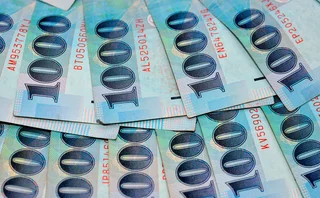
FX volatility fuels earnings hope
Banks are expecting to see increased forex trading revenues for the second quarter from increased volatility in the major currencies, officials told RiskNews ’ sister publication FX Week .
"FX is back in vogue," said one global FX head at a Canadian bank in Toronto. "This is partly due to the slump in investment banking activity. We’re hoping the early part of this year was the low ebb," he said.
"All things being equal," said another global head of FX at a major US bank, "higher volatility is generally good for market-making dealers of FX."
One global foreign exchange chief in Chicago said the pick-up had set in at the beginning of April. "Prior to that it was very difficult to spur client demand for FX with the lack of movement."
Much of the forex market’s expectations of boosted revenues has come from new evidence that the dollar’s recent fall is a long-term trend.
"We have seen real money behind the dollar selling and that suggests the trend is now in place," said one senior foreign exchange dealer at a US bank in London. The overriding trend in recent years of foreign direct investment flowing from Europe and Japan into the US has also encountered a sea change, and capital is now finding its way into different nations.
Japan has started to emerge as the surprise beneficiary: "We are seeing a 10% improvement in the yen when Japan’s economy is wracked by woes," said one senior dealer. And currencies such as the Australian dollar and Norwegian krone have also been garnering strength.
These trending markets will provide additional sources of income for foreign exchange dealing desks, officials claimed.
"A lasting trend could well be a good money-maker for banks, and it is a good thing for the FX markets," said the senior dealer in London.
Added the Canadian FX head: "Any time that markets are trending, people are more confident in increasing risk. I think now we have a two-way bet on the dollar, asset managers and currency overlay managers are also increasing trading."
Market developments since the September 11 terrorist attacks in the US have also played their part in the increased activity. "There was a lot of uncertainty post 9/11 and there was a lot of demand for the US dollar as a safe haven," said one global head of FX. "But now people are asking where the next trading opportunity will be."
Although volatility is back in the markets, banks are unlikely to go on hiring sprees to meet the demand just yet. "The market being the way it is at the moment, we are waiting to expand," said one FX sales head at a European bank in London. "We are seeing a lot of evidence of pick-up, but we need to see it sustained. We don’t want to be hiring people only to have to let them go again if this trend doesn’t hold."
Only users who have a paid subscription or are part of a corporate subscription are able to print or copy content.
To access these options, along with all other subscription benefits, please contact info@risk.net or view our subscription options here: http://subscriptions.risk.net/subscribe
You are currently unable to print this content. Please contact info@risk.net to find out more.
You are currently unable to copy this content. Please contact info@risk.net to find out more.
Copyright Infopro Digital Limited. All rights reserved.
As outlined in our terms and conditions, https://www.infopro-digital.com/terms-and-conditions/subscriptions/ (point 2.4), printing is limited to a single copy.
If you would like to purchase additional rights please email info@risk.net
Copyright Infopro Digital Limited. All rights reserved.
You may share this content using our article tools. As outlined in our terms and conditions, https://www.infopro-digital.com/terms-and-conditions/subscriptions/ (clause 2.4), an Authorised User may only make one copy of the materials for their own personal use. You must also comply with the restrictions in clause 2.5.
If you would like to purchase additional rights please email info@risk.net
More on Foreign exchange
Will Taiwan lifers ramp up FX hedging amid tariff turmoil?
As TWD remains strong against the US dollar, Taiwanese life insurers are still poised to act
Deutsche Bank takes AutobahnFX on the open road
Proprietary trading platform sets out new workflow-based approach to collaborating with venues
Dealers bullish on Bloomberg chat interface for FX markets
Service expanded its API offering to integrate broker chats into banks’ engines for cash FX pricing late last year
LCH expects to boost deliverable FX clearing with new adds
Onboarding of dealers and link-up with CLS could swell interbank deliverable FX clearing volumes
Does no-hedge strategy stack up for mag seven mavericks?
At Amazon, Meta and Tesla, the lack of FX hedging might raise eyebrows, but isn’t necessarily a losing technique
Amazon, Meta and Tesla reject FX hedging
Risk.net study shows tech giants don’t hedge day-to-day exposures
Intraday FX swaps could signal new dawn for liquidity management
Seedling market could help banks pre-fund payments in near-real time and reduce HQLA requirements
Natixis turns on the taps in flow trading
French bank boosts flow business, balancing structured solutions capabilities







